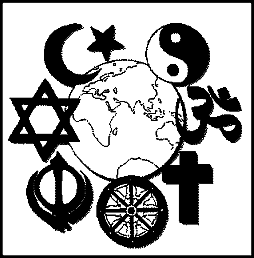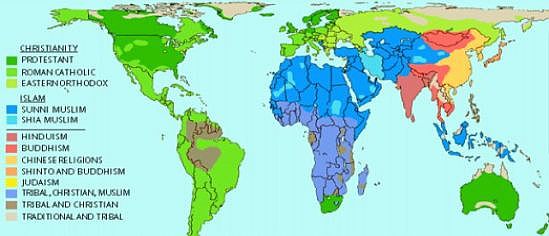Religion and Society

Religions, whatever their form, can have major social impacts in some societies - for good or for evil. But for some religions any social impacts they have may be secondary or incidental to their main declared aim of relating people to God. This site is not here concerned with considering the religious aspect of religions, but only with considering their impact on society. And the social impact of religions is normally less to do with the religion itself than its institutional form or church.
The social impact of any one church of one religion in any society is strongly affected by whether it is supported by the majority of the population or by a minority. A majority church not only directly impacts more people, but is also likely to have substantial impact on government and on society values. Generally it is the poorest societies that have the greatest proportion of the population supporting religion, though that may mean several religions rather than one religion or several churches rather than one church. But for religion's social impact, the main difference will often be between poorer societies and less-poor societies.
Poorer Societies.
Religions generally have greater social impact in poorer societies, where they tend to be supported more strongly by the majority. Often one religion will predominate and will have substantial effect on the government - either the religion controlling the government, or government using the religion in controlling the majority-poverty society.It is this type of situation that Karl Marx referred to when he stated that "Religion is the opium of the masses". Any religion that has a 'better afterlife' will tend to help the poor to live with their poverty and perhaps with exploitation and government oppression. So the poor will tend to more strongly support religion, and governments in poor societies can tend to encourage or use religion to help maintain social control. Majority churches as institutions tend to support governments and the wealthy who can finance churches better than poor believers can. In these societies religions will help maintain a social order that can include exploitation and oppression. And the claimed saying of Christ "it is easier for a camel to go through the eye of a needle than for someone who is rich to enter the kingdom of God.” must have encouraged the rich to give money to the church or maybe some to the poor ?
While a majority religion can be an ally of government or a tool of government, there are of course cases of one church of a religion gaining control over government and effectively being government, and this often means its church policies dominating a society - especially 'spread our religion'. This can mean other religions being oppressed and wars being encouraged or started against other religions or other churches. Christian Europe saw anti-heretic, anti-witch and anti-science oppressions and crusade wars against 'Infidels', moving to missionary-led worldwide oppressive colonisations - and societies motivated by other religions have done similar. And where a poor society had substantial support for two or more religions or two or more churches of one religion then fierce civil wars have often resulted.
As shown for example by the Catholic Church in Ireland, it is possible for a church to appear to be moderate and loving while actually being extreme and evil or having major or minor parts that are. And an additional issue when a religion controls government is that they are often lacking in the kinds of skills needed for efficient government, lacking skills in business, in dealings, in compromising and in handling opponents. So with the best intentions, religious government often achieves little actual good. Churches can often gain excessive influence because governments often fail to tax their incomes appropriately, and wrongly treat them like charities that provide real help to the poor when they are chiefly amassing wealth and power. Often churches are even allowed control over peoples health and child education, though science should better guide these areas. Where one religion has multiple churches, so that no one church can control government, they may still combine to exert pressure to keep government off their backs. This maybe applied to the founding of the USA with a form of government that was as pro-religion anarchistic as possible without being actual anarchy ? That can encourage new cults, churches and religions like Scientology.
News. The world economic crisis that hit in 2009, followed by a virus pandemic and currently increasing sanctions against Russia and China, sees poorer countries being hit by dramatic declines in trade and in foreign investment, and their poor facing more hardship now. This economic downturn seems to have increased the abandonment of children and of elderly women in poorer countries, and to have increased the murder of children and of elderly women in poorer countries. Often with 'justifications' that they are witches or devil-possessed, with total annual numbers estimated to be some millions. see - Victims.
Less-poor Societies.
In less-poor societies, religions generally are not supported as widely or as strongly as in poor societies, and many people will generally have less social problems also. There is somewhat less of a social need for religion, and generally religion has a somewhat weaker social impact.Where the poor have become a minority, support for a formerly majority religion can tend to coming predominantly from the non-poor and shrink among the poor who see the church as having deserted them. Many of the minority poor may tend to switch to other minority religions, while the mainstream religion continues to give weakened support for a social order that can include social exclusion of the poor and other minorities.
Minority Religion.
However, religions can often be socially at their best where they are a minority religion - especially if the minority concerned is oppressed or socially excluded. Then the church may have a useful role in socially supporting that minority. The church will be seen as independent of government and of the wealthy, and be seen as 'our church'. In this case the minority religion may also be able to somewhat press government to moderate the social exclusion of that minority. In the modern richer countries which have seen a general shrinkage in support for religion, there has also tended to be an increase in the diversity of religions with particular religions associated with particular social classes or with particular minorities. Of course members of any minority religion may become subject to extreme social exclusion for following their religion, as for example were Jews in Germany under Adolph Hitler.Charities.
In many societies there are charities that have been set up often by churches or religious individuals, and by others. These charities generally aim to somehow help some people with some problems. Sometimes their good intentions do actually achieve a lot of real good, sometimes a little good and sometime more harm than good.One main problem with charities is that they are often run by people who do not really understand the needs of those they are meant to help. Charities for the poor are generally run by the rich. Some do try to find out what help is really needed but many charities only do what they think is needed and get it very wrong. Instead of giving training a charity may give food, and instead of helping a family a charity may split-up the family. Of course government 'help' will often have similar problems and often also do little real good.
Many charities are run by 'idiots with the best intentions' who direct help to 'those most in need' people in circumstances who would naturally perish, to instead live impoverished lives for them and their children in larger numbers. Hence charity with the best intentions can largely helps maintain poverty. One example concerns wars when people have often died but modern charities often help people poor and non-poor survive wars in increasing numbers of terrible poverty 'refugee camps' housing ever-increasing millions. So some charity just creates terrible refugee-camp poverty. Of course there is a little good charity, but good technological and economic progress depends on basic science experimentation which gets little or no charity help.
The social significance of different religions.
The relative social significance of different religions in the world today is perhaps somewhat difficult to estimate.Statistics indicate Christianity in 2002 having the world's largest number of supporters, at around 33%, and as concentrated somewhat more in richer countries. Islam seemed to be a close second on number of supporters, about 22%, with Hinduism in third place at around 15%. Buddhist supporters seem to follow on about 6%, with Chinese Traditionalism around 4% and Judaism only about 0.2%.
 See Knowers Ark and Adherents.com.
See Knowers Ark and Adherents.com.
However, these 2002 numbers do not fully take account of the fact that most religions are divided between often many different competing churches. And these numbers do not take account of strength of support - for some religions including many more nominal or marginal supporters than for other religions. Also some religions may help or encourage business or political action more by its members, than other religions do. And among religions with different churches some of them may be more extreme than others and some of them may be better at hiding their extremism. There can be plenty of lying in religions as in political movements, though some of it may be unintentional lying by people themselves believing the lies to be true. The above 2002 religions map indicates Protestant Christian countries especially as then being dominant in the most advanced and richer countries. But it seems likely that in richer countries especially there may be a substantial under-reporting of 'no religion' that may also have been increasing over time and the size of this group may have affected some of those countries.
Religion basically seems to be a social construct that helped maintain social order in feudal-style societies, but politics and science seem in more recent times to gradually replace religion not as being better but as being better suited to maintaining more modern societies. Generally it seems that the social impact of religions is tending to fall as countries get richer, but much of the world does still remain in poverty with religions having much influence. And science which has been the basis of most progress, and should be helping everybody, is unfortunately controlled chiefly by and for the rich and the powerful. (see World Poverty and New Science Theory)
NOTE. Some religions have a 'God made the universe and mankind' creation story and, despite the fact that such religious stories are about God and do not claim to be science, some see a claimed conflict with evolution science. Interestingly the Jewish-Christian creation story involves mankind (many of whom are very ungodly) being created 'in the image of the maker' and then immediately the maker 'ends his work and rests'. This looks quite like the development of an intelligent species progressing to making robots in their own image to do their work - like the development of mankind, or maybe of another intelligent alien species ?
(See an interesting new science website on this at Philosophy of Science.)
Contact us by email :-
You are welcome to link to any page on this site, eg http://www.social-exclusion-housing.com/religion-and-society.html
© Social Exclusion Housing, 2025 - taking care with your privacy, see Social Exclusion Housing HOME.